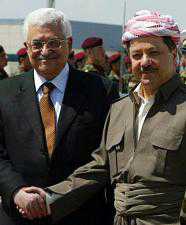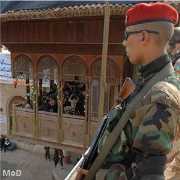Haroutiun Khachatrian 4/15/09
Armenian President Serzh Sargsyan’s two-day visit to Iran produced a potential breakthrough deal that could ease Armenia’s economic isolation.
Sargsyan and Iranian President Mahmoud Ahmadinejad signed eight agreements during the Armenian leader’s two-day stay in Tehran on April 13-14. Two of those pacts stand to give a big boost to Armenian foreign trade. The first provides a blueprint for the construction of a 470-kilometer railroad between the two countries and the second would lower Iranian trade barriers to Armenian exports.
At present, Armenia’s only viable overland routes to the outside world run through Georgia. That conduit has proven unreliable for Yerevan in recent years, though, given the long-running tension between Russia and Georgia. [For background see the Eurasia Insight archive]. Turkey and Azerbaijan currently maintain an economic blockade against Armenia, and although there has been much talk lately of a re-opening of the Turkish-Armenian frontier, the normalization of Turkish-Armenian ties, as well as a political settlement to the Nagorno-Karabakh conflict, do not appear imminent. [For background see the Eurasia Insight archive].
The proposed outlet to Iran would not bring immediate economic benefits to Armenia. Under terms of an agreement finalized April 15 by the transport ministers of Armenia and Iran, construction of the railway would take an estimated five years, and cost upwards of $1.8 billion. The first stage of the construction process involves a feasibility study, which is due to be completed by the end of the summer.
Almost seven-eighths of the railway would lie on Armenian territory, stretching from the northern city of Sevan to Meghri on the Iranian border. The question of financing evidently was not addressed during Sargsyan’s Iran visit.
In another potentially significant deal, the two countries agreed to cooperation on the construction of a hydropower station on the Arax River.
One political analyst, Garnik Asatrian, an Iranian studies expert at the Yerevan State University, characterized President Sargsyan’s visit as a “historic step” for Armenia. But other experts were more circumspect. The global economic downturn, they emphasized, makes it impossible to say whether promises made today can be fulfilled tomorrow. Alexander Iskandarian, the director of the Caucasus Institute in Yerevan, pointed out that already some erstwhile financial heavyweights in the Caucasus, especially Russia, are now finding it difficult to come up with the cash to meet assistance obligations. “Some previously adopted programs are now short of money,” he told EurasiaNet.
Sevak Sarykhanan, an expert with the Noravank Foundation, a Yerevan-based think tank, suggested that the Iranian rail project is, in effect, an insurance policy for Yerevan. If the Turkish-Armenian border reopens in the near future, then Yerevan would have rail access to the Middle East and Gulf regions via the existing Gyumri-Kars rail link. In that case, the Sevan-Meghri-Iran rail route would not make financial sense.
Editor’s Note: Haroutiun Khachatrian is a freelance writer based in Yerevan.




 Soner Cagaptay
Soner Cagaptay

